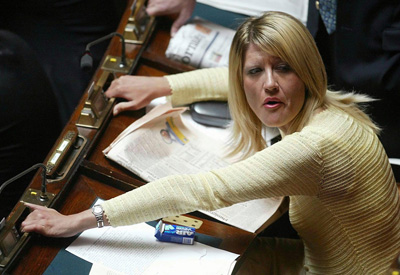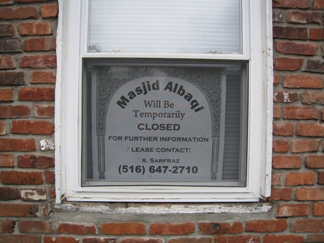National debate over a “burqa ban” was back in the spotlight on Tuesday following an official request for the Senate to discuss the security implications of Islamic face coverings. Senator Ada Spadoni Urbani of Premier Silvio Berlusconi’s People of Freedom party group (PdL) presented a motion on behalf of her party addressing the issue. The motion is aimed “at resolving the public security issues raised by the custom of wearing the burqa or other clothing that prevents accurate identification,” she explained. “This is not intended to discriminate in any way against religious beliefs”.
The rightwing Northern League party promised a bill on the issue on Friday, while a row has been simmering for a number of days over whether a mother should be permitted to wear a face veil while dropping her child off at nursery school. Other parents at the school in the small Lazio village of Sonnino had reportedly complained to the school’s head that the woman’s niqab scared their own children. On Monday, Sonnino Mayor Gino Cesare Gasbarrone announced a compromise had been reached following a meeting with all parties whereby the woman had agreed to remove the veil once on the school premises.
Meanwhile, the Northern League proposal, a translation of the recently approved French bill, will join eight other draft laws already under consideration by parliament. The bill would prevent women from wearing a face veil in public, including in schools, on public transport or in any kind of office. The penalty for transgressors would be a fine of between 150 and 300 euros or alternatively some kind of community service “aimed at encouraging integration”, explained League Deputy Whip Carolina.
But unlike other proposals, the new bill will also punish anyone “who forces someone else to wear it, using either physical or psychological violence”. This offence would be punishable by a year in prison and a 30,000 euro fine.
A 1975 law already prohibits any mask or clothing that makes it impossible to identify the wearer. In its current form, it permits exceptions for “justified cause”, which has been interpreted as including religious reasons in court rulings against local attempts to ban the burqa and niqab. Most of the bills currently before the Italian parliament would amend the 1975 law to make specific reference to Islamic face coverings.
Commenting on the Sonnino case, Isabella Bertolini of the PdL said the case demonstrated a “growing imperative for a complete ban on the burqa in all places, not just in schools”. “Our society’s flexibility leads our institutions at all levels to interpret laws in the most politically correct way possible, causing incalculable damage,” she said.

 Italy’s anti-immigrant North League party has introduced a bill in the lower house of parliament seeking ban on burqa, the full body veil worn by Muslim women.
Italy’s anti-immigrant North League party has introduced a bill in the lower house of parliament seeking ban on burqa, the full body veil worn by Muslim women. During the 11 years that Masjid al-Baqi, a mosque on Central Avenue in Bethpage, has provided religious services for area Muslims, there have been some tensions with community members: a few neighbors have complained about the cars that spill onto local streets during Friday services and religious holidays and, in late 2001, mosque leaders say that a drunken resident smashed some of the building’s windows with a baseball bat and damaged cars in the parking lot.
During the 11 years that Masjid al-Baqi, a mosque on Central Avenue in Bethpage, has provided religious services for area Muslims, there have been some tensions with community members: a few neighbors have complained about the cars that spill onto local streets during Friday services and religious holidays and, in late 2001, mosque leaders say that a drunken resident smashed some of the building’s windows with a baseball bat and damaged cars in the parking lot.